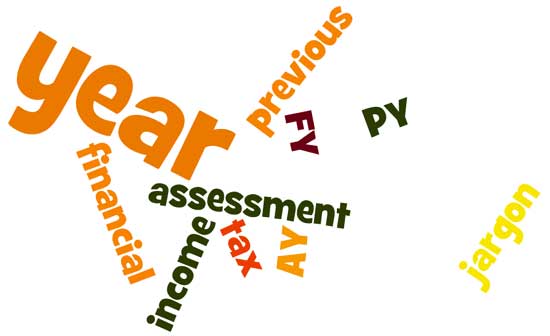It is income tax filing season and you must be a victim of the often heard mumbo jumbo called Financial Year (FY), Assessment Year (AY) and Previous Year (PY). These are terms very commonly heard before July 31st, which is the last date for filing your income tax returns.
If you closely look at the income tax return form, you will notice the term Assessment Year used very frequently and the other two terms hardly find a mention.
For someone who does not come with some finance background, these terms might ground you into despair. But wait till you have actually understand what they are. You will realize it is pretty logical !
What is Financial Year (FY)
Let us first start by understanding what Financial Year or FY means in the income tax language. The name is intuitive. What this indicates is the year for which your financial information gets reported to the government. Not just individuals, any assessee will have to report income for a financial year.
In India, the financial year starts from April 1st and ends on March 31st of year next. If you are an employee, you will relate to this more as your Form 16 contains this terminology.
If you see the screenshot below, you will realize that the period mentioned in the Form 16 is “FROM” and “TO”. That is the financial year for you.

Note that the financial year is depicted as FY11-12 or as FY 12. There are other ways it can be used in many places, democracy does have no limitations.
Another thing to note is that this term is not applicable just for employees but also for any entity that earns some income or revenue. In short, the income tax rules expect an individual, a HUF, a firm or company, among others to file returns for revenue generated during a financial year.
What is Assessment Year (AY)
Which brings us to the important terminology – Income Tax Assessment Year or AY as it is called.
Now if you think for a moment, if the financial year for assessing your income tax ends on March 31st, then you can do the assessment and filing of income tax returns post this date. So the year in which you are doing the assessment and filing of your income for any financial year which has passed by or just ended is called Assessment Year.
Date wise, both FY and AY are from April 1st to next year’s March 31st but it is the activity that you do and refer to in these 12 months that help you refer to them as financial year or assessment year.
Previous Year (PY)
You should be able to infer this yourself. The word previous is a big give away. Yeah you are right – this is the year for which your income is being assessed in the Assessment Year. A short form of this is PY which stands for Previous Year.
In an assessment year, you file your income tax returns of the previous year.
Let us see some examples.
| Previous Year (PY) | Financial Year (FY) | Assessment Year (AY) |
|---|---|---|
| 1st April 2008 – March 31st 2009 | FY 08-09 | AY 09-10 |
| 1st April 2009 – March 31st 2010 | FY 09-10 | AY 2010-11 |
| 1st April 2007 – March 31st 2008 | FY 07-08 | AY 08-09 |
Conclusion
As I promised to you earlier, it is pretty simple. Isn’t it ?
Income tax planning and filing seem to be very difficult tasks for investors but if you strive to educate yourself bit by bit, then over a period of time you will clear out all the cobwebs. These three income tax terminologies as you can see were simple.
Should you have any clarifications or a better way to look at these, let me know.










Very informative post, will be helpful to readers. As i come from commerce background i was aware of these terms.
Yeah, it is all about honing your knowledge and keep reading to learn more and more.
Thanks for reminding :). I think you have also written a similar article before….. may be long back.
Nah, I dont think so.
Hummm you are right it was not an article :(.
It was just a (small) part of this article https://www.thewealthwisher.com/2010/07/30/missed-the-income-tax-return-itr-filing-deadline-of-31st-july/ As I read it here I thought so :).
If I want to fill ITR-1 for the period 2013-2014 then what is my assessment year. Or which form and assessment yr will be applicable to me
thank you, learning about this again
I have to file Form 15 G and in it, it says Last assessment year in which Assessed. I have e filed the income tax for AY 15-16 but have not verified it yet. Is my tax status assessed or not for AY 2015-16?
You should verify it first… online or by sending hard copy signed to CPC Income Tax Bengaluru.
Very simple and Good One !!
Thanx… Check out the latest posts too..
what for the word PY introduced?
FY is good enough.
Simply to confuse the poor illiterates (?)
dear friend ,
im commerce graduate. But………..you explalined simply and nice,,,,,and nice cote ””” democracy does have no limitation”””” , nice satire……. but really, misused democracy in our country for falthu things.
Dear Bala,
thanks for ur comment, but think from a non-commerce point. simple things are often made complex by regulators or usage. I m just trying to simplify things.keep visiting our website for more reformed articles